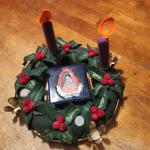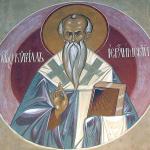Hi! I am a sociologist on a tour of Texas Megachurches. Check out my first post here.
When I first began this tour, I set out looking to document how Texas churches do (or do not) advance what sociologists call Christian Nationalism. Per sociologists Sam Perry and Phil Gorski, “Christian nationalism is an ideology that idealizes and advocates a fusion of American civic life with a particular kind of Christianity.” At its core, Christian Nationalism expresses a priority for Christianity in national politics and often, though definitely not always, adds a priority for whiteness into this mix. Given my long tenure in the San Antonio area, I hoped there might be a wide enough range of megachurch cultures that my visits could nuance how we think about Christian Nationalism –and maybe challenge how some think about Texas!
To my own surprise, in all three of the megachurches I covered for this series this fall–again, looking for Christian Nationalism–I heard a very clear emphasis on the maximum importance of the nation of Israel (not the US) and the Jewish people. (This has been all the more surprising, in part, because Gorski and Perry have cited clear strains of anti-semitism in Christian Nationalism.)
In the weeks since October 7th, I have continued visiting churches around San Antonio, listening for charismatic/evangelical responses to the conflict in Israel and Palestine. Here are notes on a couple of ways that churches I’ve previously covered are contextualizing the ongoing war in Gaza.
Community Bible Church, Guest Speaker David Nasser
On my visit back to Community Bible Church (CBC), I was surprised to find a guest speaker of Iranian descent (who had already been scheduled to address CBC, prior to the eruption of war) as the person providing limited context for CBC’s audience on the conflict currently going on in Palestine. In his sermon, guest preacher David Nasser exhorted the roughly 15k people in attendance to see Muslims as “not the enemy, but the prize”– for conversion. Nasser recounts his own conversion from Islam at age 18 (30:00), as being the result of persistent efforts by 17 Southern Baptist teenagers. Nasser recalls how this youth group “came over on Monday nights to tell [his] family, ‘There is only one savior, his name is Jesus.’” Stunningly, in this political climate, Nasser jokes, “We were the Iranians, but we got terrorized by a Southern Baptist youth group. They loved me enough to tell me the truth.” Though at first his parents protested Nasser’s conversion, ultimately Nasser’s whole family comes to Christ. Nasser testifies: “I’ve seen the power of the gospel in the life of an individual…In God’s sovereignty, God has brought an Iranian missionary to Texas to ask you what kind of relationship you have with Him”(41:01). Nasser’s testimony demonstrates what has long been true: evangelism is one of the four defining hallmarks of the movement. At a time when global politics pose confounding dilemmas amidst grave losses of life, Nasser’s sermon effectively displaces ethical and political conflicts with spiritual ones, ie the need for salvation; such displacement is truly an evangelical tradition. Given his own ethnic and religious background, Nasser’s rhetoric gave CBC listeners reason enough to see Muslims as potential subjects of salvation, with little offered in the way of ethical considerations for inter-religious relations.
The God Who Holds Tomorrow, Cornerstone Church, Pastor Matt Hagee
Over at Cornerstone Church, (son of pastor John Hagee) Pastor Matt Hagee took an equally (maybe even more) traditional evangelical approach to contextualizing troubles in the Middle East: Hagee pulled out a calendar to plot this current conflict on a divine schedule of “end times” events. Like a long line of Pentecostals before him, Hagee utilizes up-to–the minute technology (10:15) to broadcast his timeline– but Cornerstone’s wealth means that his calendar is 10 feet long and digital. Hagee stands like a meteorologist in front of a weather map, using a laser to direct audience attention (some 20k) from 586 BC to 1948 and then 1967, and then to today. From minute 10, Hagee uses Ezekiel 37 to name the Valley of Dry Bones passage as the origin of present-day Israel. Minute 16 features a map that superimposes names of kingdoms in Ezekiel: Magog, for example, onto what is present-day Russia. In Hagee’s take, the past and the present are like a mobius strip: ancient Israel and present-day Israel are the one and the same– the true protagonist of divine history.
But, to be sure, Israel is not the only important nation. I started this series to document what aspects of Christian Nationalism I could find operative in Texas megachurches. I quickly found that San Antonio megachurches were often more obviously Zionist than they were Americanist. The eruption of conflict in Israel and Palestine means that area pastors are narrating Israel and the United States role in this conflict in tandem. Here is how Cornerstone captioned this sermon:
“We see immense struggle across the globe at every level. People are fighting for control. Nations are working to unseat the Super Power that is the United States. Communism is trying to overwhelm capitalism. Inflation is out of control! We are working harder for less and asked to pay more. Where do we turn? Our hope lies in the fact that God is in control. No government can overthrow him; no regimen can control him. The Bible tells us that, before Jesus’ return, there will be signs We are seeing these all around us, yet we do not live in fear. It is time to look up! Our redemption draws near!”
In Hagee’s sermon, I think I hear –not predominant Zionism or a competing preference for US primacy, but instead –something like twinning of nationalist concerns.
From minute 7, Pastor Matt begins rehearsing the birth of Israel as the birth of nation “in one day” which phrase he expounds on with reference to Isaiah 66, verse 8:
“Who has ever heard such a thing? Who has seen similar things? Could a land be born in a single day? Would a nation be born at once? But Zion has been in labor and has given birth to her children.”
Hagee used this passage to contextualize May 14, 1948, the day David Ben-Gurion, the head of the Jewish Agency, proclaimed the establishment of the State of Israel, as the prophetic context for the nation of Israel’s founding.
In this short history, I note that Pastor Matt referred to the Arab-Israeli War of 1948 as Israel’s “War of Independence.” I imagine that his audience might conjoin Israel’s war for independence with America’s. Listening to this part of Hagee’s sermon, I was struck by just how much evangelical and charismatic thinking about nations, about nation-ness, is informed by Hebrew Biblical texts.
I’ve been asking myself to what degree evangelicals might be more Zionist than U.S.-centric and nationalist. But perhaps it is best to consider that Christian Nationalism, as we have come to understand it, may be inseparable and continually reinforced by Zionism.
If so, I expect that conflict in Gaza will intensify the religiosity of what will likely be a wild election season.













